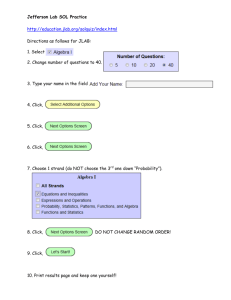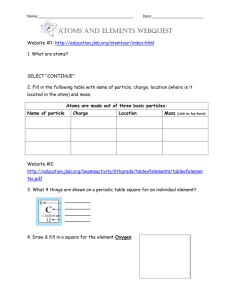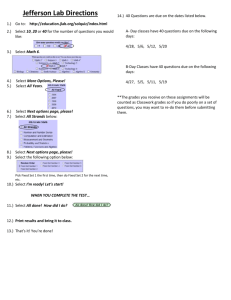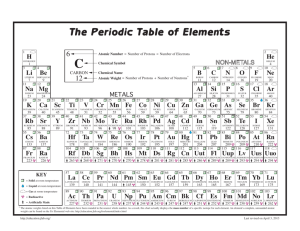PPTX - JLab Computer Center
advertisement
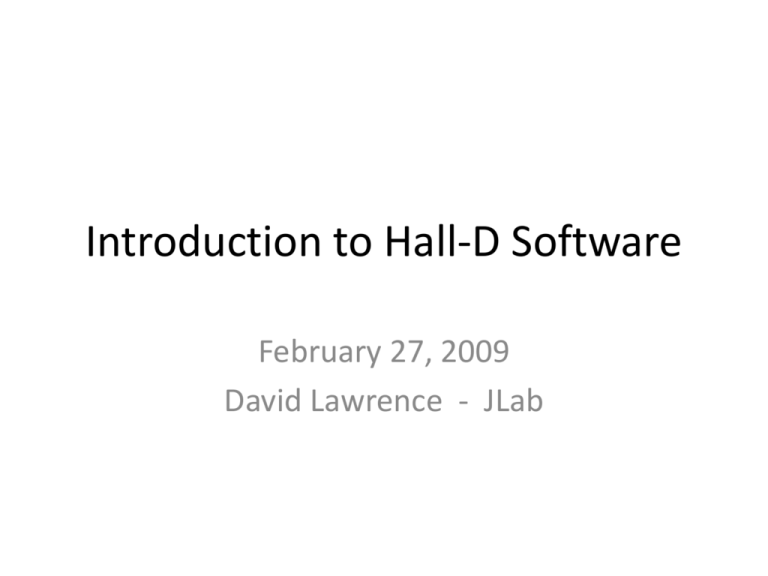
Introduction to Hall-D Software February 27, 2009 David Lawrence - JLab Online Documentation • Wiki : http://www.jlab.org/Hall-D/software/wiki (click on “Offline Software” on Right-hand menu) • DocDB : http://portal.gluex.org (click on “Documents” in upper right corner) • JLab mailing lists : halld-offline@jlab.org halld-mc@jlab.org • doxygen: http://www.jlab.org/Hall-D/software/HDSoftware_Documentation • JANA : http://www.jlab.org/JANA Using pre-compiled binaries on the JLab CUE • Pre-built binaries exist on the Hall-D group disk for every tagged release in /group/halld/Software/builds • Builds for both Fedora 8 and RHEL5 exist in the same directory structure. The environment can be set up to use a build by sourcing the setenv.csh file in the appropriate release directory e.g. source /group/halld/Software/builds/release-2009-02-24/setenv.csh Creating a private build of Hall-D Offline Software The next few slides will give info on how to create a private build on you own computer including: • Required 3rd party packages • Accessing the Hall-D subversion repository • Organization of source code • Environment • Creating a build using BMS Required 3rd Party Packages • JANA (Jlab ANAlysis framework) – Event processing and calibration DB access • CERNLIB – GEANT3 Monte Carlo • ROOT – Reconstruction – Event Viewer – Tree/histogram creation • XERCES (XML parser for C/C++) – Read in XML geometry for both simulation and reconstruction – HDDM (Hall-D Data Model) tools The Hall-D Subversion Repository • Anonymously accessible via WWW – https://halldsvn.jlab.org/repos • subversion has command syntax that mirrors CVS (for the most part) Check out release: svn co https://halldsvn.jlab.org/repos/tags/release-2009-02-24 Update changes from repository: svn update Commit changes: svn commit List repository contents: svn ls https://halldsvn.jlab.org/repos/tags Calibration and Conditions Database • Few calib./cond. parameters exist now (e.g. Bfield map), but they are necessary for running both simulation and reconstruction code • Get them from the repository like this: svn co https://halldsvn.jlab.org/repos/trunk/calib • Set environment to use them like this: setenv JANA_CALIB_URL file:///path/to/calib Organization of Source Code $HALLD_HOME Environment Creating a Build Using BMS • Build Management System is simply a set of standard “makefile”s used to build the Hall-D code. To do a “standard” build, just invoke “make” from $HALLD_HOME/src • BMS compiles all files with .cc, .c, or .F suffixes in a directory Makefile for hd_root PACKAGES = ROOT:DANA include $(HALLD_HOME)/src/BMS/Makefile.bin About 80% of the Makefiles in programs directory have 2 or 3 lines! Use of the HALLD_MY environment variable The HALLD_MY environment variable can be used to develop or modify a small piece of the code in a private area while using headers and libraries from a common build that is in a public area. setenv HALLD_HOME /group/halld/Software/builds/release-2009-02-24 setenv HALLD_MY ~/HallD cp -r $HALLD_HOME/src/programs/Analysis/hd_ana ./ cd hd_ana make <…. builds private hd_ana executable ….> <… run program from private directory …> $HALLD_MY/bin/$BMS_OSNAME/hd_ana hdgeant.hddm Looking at an HDDM data file Files used for generated events and simulated data are in HDDM format. This is unique to Hall-D, but several tools exist to inspect and manipulate them. • hd_dump – Dump single event information to screen one event at a time • hdview2 – Draw single event graphically with GUI • hd_ana , hd_root – Batch processing of large numbers of events usually to produce ROOT files with trees/histograms The hd_dump program hd_dump hdgeant_1photon.hddm -DDMCThrown -DDPhoton All reconstruction algorithms are automatically activated and list of all objects produced is shown first Objects specified for printing are printed next The hdview2 Event Viewer hdview2 hdgeant.hddm • Somewhat primitive, but still useful for certain single event diagnostics • Drawing of both charged and neutral tracks • Easily turn on/off drawing of tracks at various stages of reconstruction (helical fit, wire-based fit, time-based fit) • ROOT based Filling ROOT trees and histograms from HDDM data There are multiple ways to generate ROOT TTree and histogram objects from data in HDDM files • janaroot plugin • existing Hall-D plugins • Customizing your own executable or plugin I’ll briefly describe the first 2 options here and will leave the last one for later when you need more advanced control over the reconstruction The janaroot plugin hd_ana --plugin=janaroot --auto_activate=DParticle hdgeant.hddm root janaroot.root janaroot will generically make TTree objects from the data objects produced in JANA Same mechanisms used to print data to screen in hd_dump are used to create trees so anything you see there, will show up here. The event TTree includes all other TTrees allowing leaves of one tree to be plotted against leaves of another Useful for getting started without having to learn a lot about JANA Other DANA plugins Several plugins already exist that make various ROOT trees and histograms. Any number of these can be added to the command line (via the --plugin=XXX argument) to have all of the trees/histograms show up in the same ROOT file If one of these doesn’t give you exactly what you need then one of them should at least provide a reasonably close example that can be tweaked. In particular, you may want to look at invariant_mass_hists for a examples on making r and po invariant mass histograms. Summary • The first stop when looking for information on Hall-D software should be the GlueX Wiki (http://wiki.gluex.org) • All of the software is available for anonymous checkout from the Hall-D subversion repository • Questions can be sent to one of the halld mailing lists : halld-mc@jlab.org and halldoffline@jlab.org
